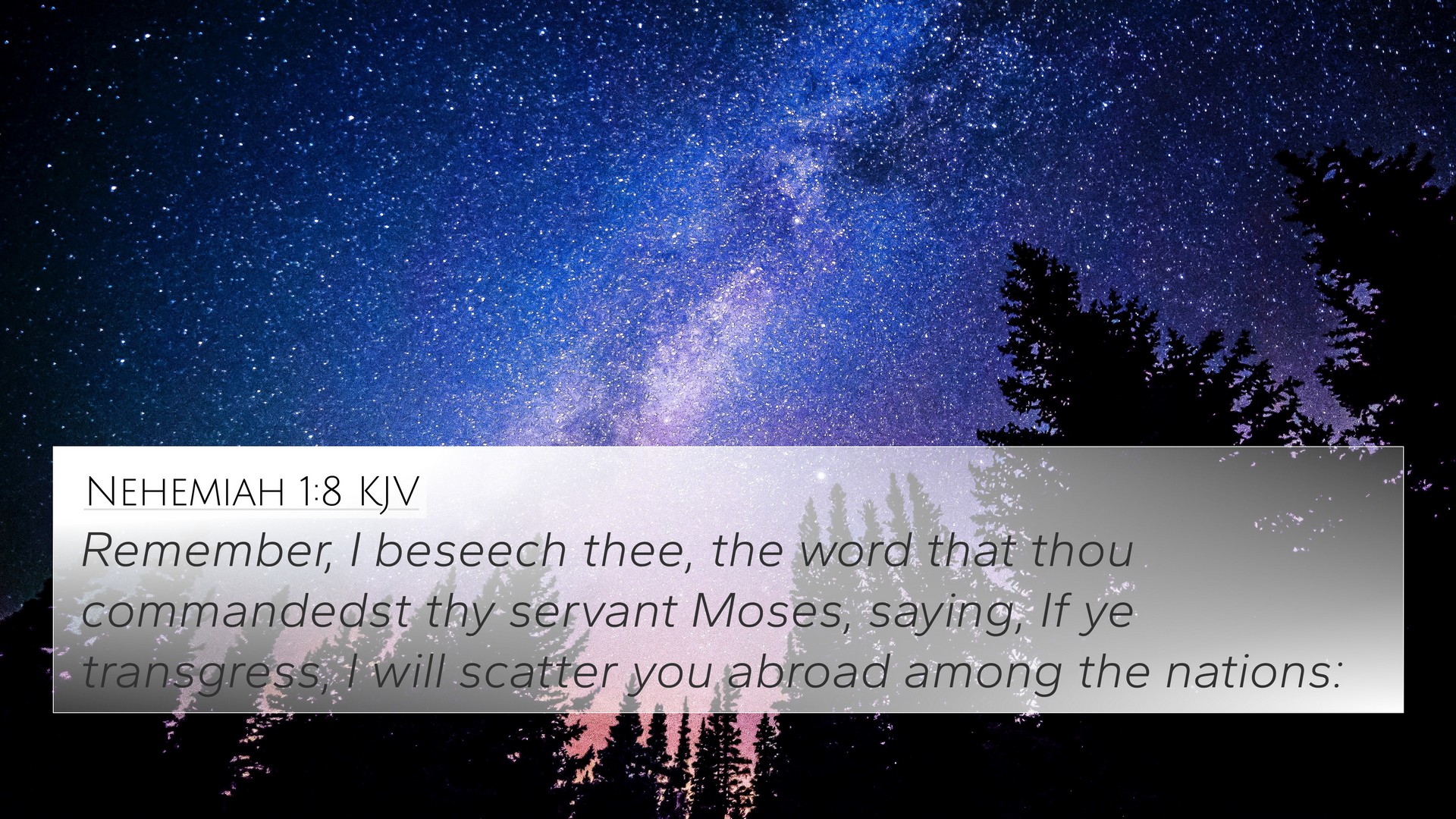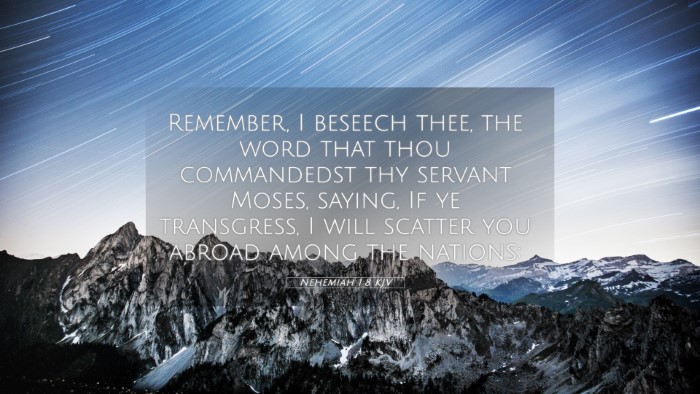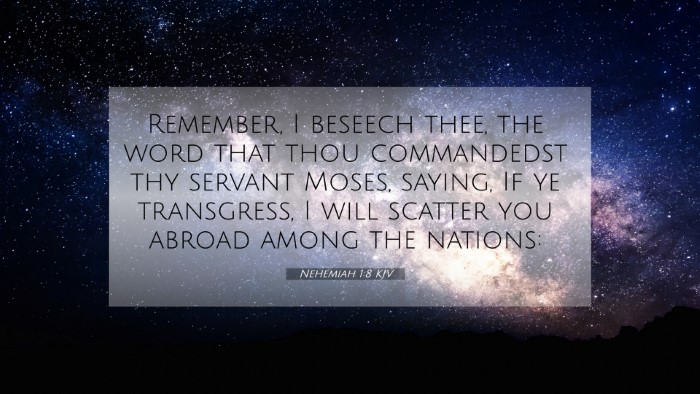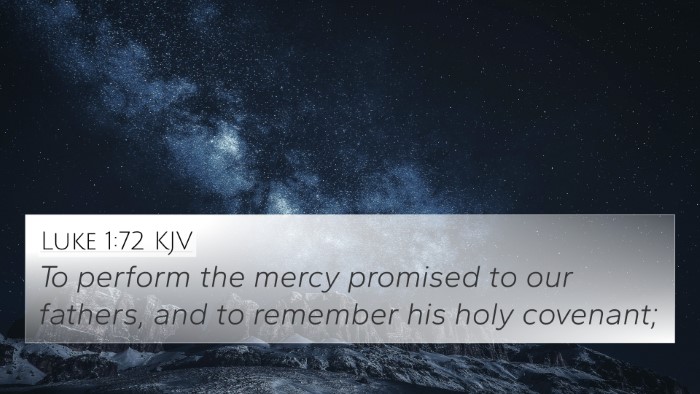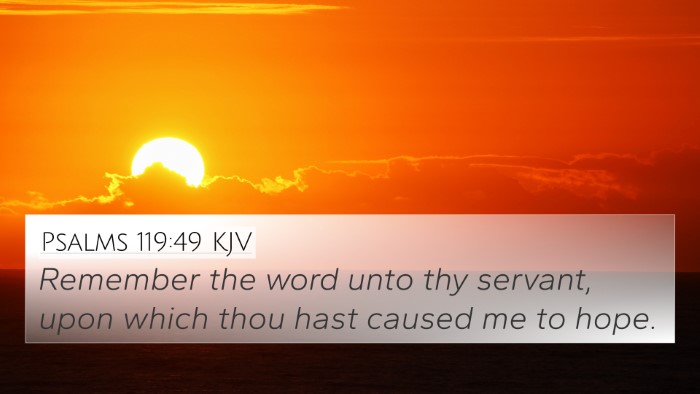Old Testament
Genesis Exodus Leviticus Numbers Deuteronomy Joshua Judges Ruth 1 Samuel 2 Samuel 1 Kings 2 Kings 1 Chronicles 2 Chronicles Ezra Nehemiah Esther Job Psalms Proverbs Ecclesiastes Song of Solomon Isaiah Jeremiah Lamentations Ezekiel Daniel Hosea Joel Amos Obadiah Jonah Micah Nahum Habakkuk Zephaniah Haggai Zechariah MalachiNehemiah 1:8 Similar Verses
Nehemiah 1:8 Cross References
Remember, I beseech thee, the word that thou commandedst thy servant Moses, saying, If ye transgress, I will scatter you abroad among the nations:
Uncover the Rich Themes and Topics of This Bible Verse
Listed below are the Bible themes associated with Nehemiah 1:8. We invite you to explore each theme to gain deeper insights into the Scriptures.
Nehemiah 1:8 Cross Reference Verses
This section features a detailed cross-reference designed to enrich your understanding of the Scriptures. Below, you will find carefully selected verses that echo the themes and teachings related to Nehemiah 1:8 KJV. Click on any image to explore detailed analyses of related Bible verses and uncover deeper theological insights.

Deuteronomy 28:64 (KJV) »
And the LORD shall scatter thee among all people, from the one end of the earth even unto the other; and there thou shalt serve other gods, which neither thou nor thy fathers have known, even wood and stone.
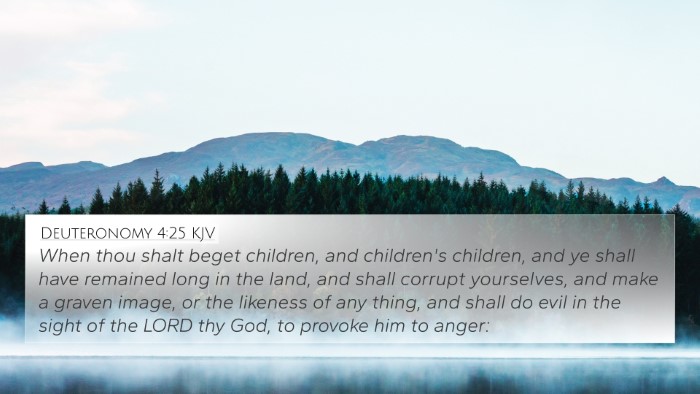
Deuteronomy 4:25 (KJV) »
When thou shalt beget children, and children's children, and ye shall have remained long in the land, and shall corrupt yourselves, and make a graven image, or the likeness of any thing, and shall do evil in the sight of the LORD thy God, to provoke him to anger:

Leviticus 26:33 (KJV) »
And I will scatter you among the heathen, and will draw out a sword after you: and your land shall be desolate, and your cities waste.
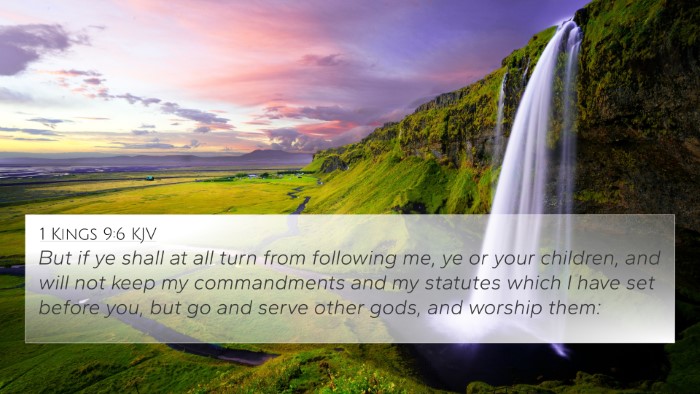
1 Kings 9:6 (KJV) »
But if ye shall at all turn from following me, ye or your children, and will not keep my commandments and my statutes which I have set before you, but go and serve other gods, and worship them:

Deuteronomy 32:26 (KJV) »
I said, I would scatter them into corners, I would make the remembrance of them to cease from among men:
Nehemiah 1:8 Verse Analysis and Similar Verses
Understanding Nehemiah 1:8
Nehemiah 1:8 reveals the deep anguish and concern Nehemiah felt for Jerusalem and the Jewish people. He prays to God, asking Him to remember the word He gave to Moses, that if His people returned to Him, He would gather them and bring them back. This verse serves as a profound reminder of the importance of God’s promises and the call to repentance.
Key Themes
- The Importance of Prayer: Nehemiah’s prayer reflects a willingness to intercede for his people.
- God's Faithfulness: The invocation of God's promises to Moses illustrates God's steadfast nature.
- Return to God: The call for the Jews to return signifies repentance and restoration.
Commentary Insights
This verse is rich in commentary. By examining insights from respected public domain commentators, we find profound meanings layered in the text.
Matthew Henry's Commentary
Matthew Henry emphasizes the earnestness in Nehemiah's prayer, highlighting the importance of remembering God's covenants. Nehemiah's plea for God to remember is a reflection of his faith in God's promises. Henry points out that prayer is the channel through which the faithful can request God's intervention and grace.
Albert Barnes' Commentary
Albert Barnes elaborates on the significance of Nehemiah's appeal to God's promises made to Moses. He notes that this reference not only shows Nehemiah's knowledge of Scripture but also his understanding of God's redemptive plan for Israel. Barnes underscores the theme of divine faithfulness throughout the history of God's people, urging that God’s words to Moses were intended for the continuity of His covenantal relationship with Israel.
Adam Clarke's Commentary
Adam Clarke interprets this verse as a poignant reflection on the state of Israel and its disobedience. Clarke points out that Nehemiah acknowledges the consequences of sin while simultaneously invoking God’s mercy and restoration. His commentary stresses that God's willingness to forgive and restore is central to the theology of the Old Testament.
Bible Cross References
To enhance understanding, several Bible verses relate closely to Nehemiah 1:8, amplifying its themes and messages:
- Deuteronomy 30:1-5: Addresses the promise of restoration after exile if the people return to God.
- 2 Chronicles 7:14: Speaks of God's conditional response to the prayers of His people.
- Jeremiah 29:14: Prophecies regarding God gathering the exiles.
- Moses' events in Exodus 32:11-14: Shows intercession on behalf of Israel, linking Nehemiah's actions with Moses'.
- Psalm 51:17: Illustrates God's desire for a contrite heart as a prerequisite for restoration.
- Isaiah 44:21-23: Calls God's people to remember Him and His promises.
- Ezra 1:1-4: Highlights the decree of Cyrus allowing the return of exiles.
Thematic Bible Verse Connections
Nehemiah 1:8 is tied to numerous themes and connections across scripture:
- Repentance: Illustrated in the call for returning to God seen in various prophetic texts.
- Restoration: The theme of restoration is prevalent throughout the Old Testament, particularly in the writings of the prophets.
- Divine Intercession: The model of prayer and intercession for the nation is echoed in other narratives such as those in Daniel and Exodus.
- Faithfulness of God: Stories of God's faithfulness towards Israel resonate throughout scripture, particularly in the Torah and prophetic literature.
Conclusion
Nehemiah 1:8 serves as a poignant reminder for believers of the importance of prayer, the seriousness of sin, and the assurance of God's faithfulness. Through intercession and reliance on God's promises, we see God's nature of mercy and restoration vividly portrayed. Understanding its implications requires delving into the broader biblical narrative, revealing connections that further enrich our faith and obedience.
